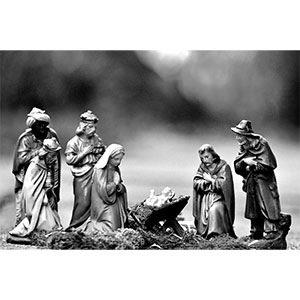During Advent, Christians around the world gather together and exchange gifts. We do this because the act of gift-giving reflects and rehearses the Ultimate Gift of God becoming man in the birth of Jesus. The exchanging of gifts help us to unite as the people of God and reflect upon the hope that is in Immanuel—Christ with us.
This season, I’ve had the privilege of working my way through John Barclay’s wonderful new book, “Paul and the Gift.” In this book, Barclay explores Paul’s theology of “gift” as it pertains to what Christ has done in human history. In his letters, Paul uses multiple ways to articulate his theology of grace as gift. Barclay does a masterful job treating the historical context of Paul’s world, the historical development of the doctrine of grace and important exegetical work concerning Paul’s theology of grace in Galatians and Romans.
The strength of this book, though, lies in its ability to articulate the communal implications of “gift” for the people of God.
I want to share a particular passage that has impacted me in light of gift, community formation, and Advent. It’s a bit long and dense, but I believe Barclay is able to say more in this paragraph than I could in an entire post (this is how most of the book is written, which is one of many reasons why it is so good). In this paragraph, Barclay summarizes the important implications of the gift we have been given in Christ as Paul understands it. It is a beautifully written piece of theology that is perfect for Advent reflection as we contemplate what Barclay calls the “Christ-event” in the coming of Jesus—God-with-us.
Paul’s notion of the incongruous Christ-gift was originally part of his missionary theology, developed for and from the Gentile mission at the pioneering stage of community formation. Since God’s incongruous grace dissolves former criteria of worth, it forms the basis for innovative groups of converts, by loosening their ties to the pre-constituted norms and uniting them in their common faith in Christ. The starting point is the framing of the Christ-event as gift. Christ’s death “for our sins” (e.g., 1 Cor 15:3-4) is interpreted by Paul in the language of gift (God’s gift of his Son, or Christ’s gift of himself). The life, death and resurrection of Jesus are thus, for Paul, the focal point of divine beneficence: the witness of Scripture and the history of identity of Israel are interpreted in this light. Grace is discovered in an event, not in the general benevolence of God, and its focal expression lies not in the creation nor in any other divine gift, but in the gift of Christ, which constitutes for Paul the Gift. (Barclay, 2015, p. 566)
The Christ-event—His birth, life, death and resurrection—totally reshapes the make up of God’s people so that those who were left out can now enter God’s grace and form a new community. The gift is both the means of making it happen and the blessed result of union with Christ and His community.
This book is truly a gift to my walk with God and has significantly helped my understanding of grace. As you give gifts this Advent season, make sure to do so in the Spirit of the Ultimate Gift in Christ. As the people of God, may we truly experience the weight of God’s “divine beneficence” in Christ this season.






